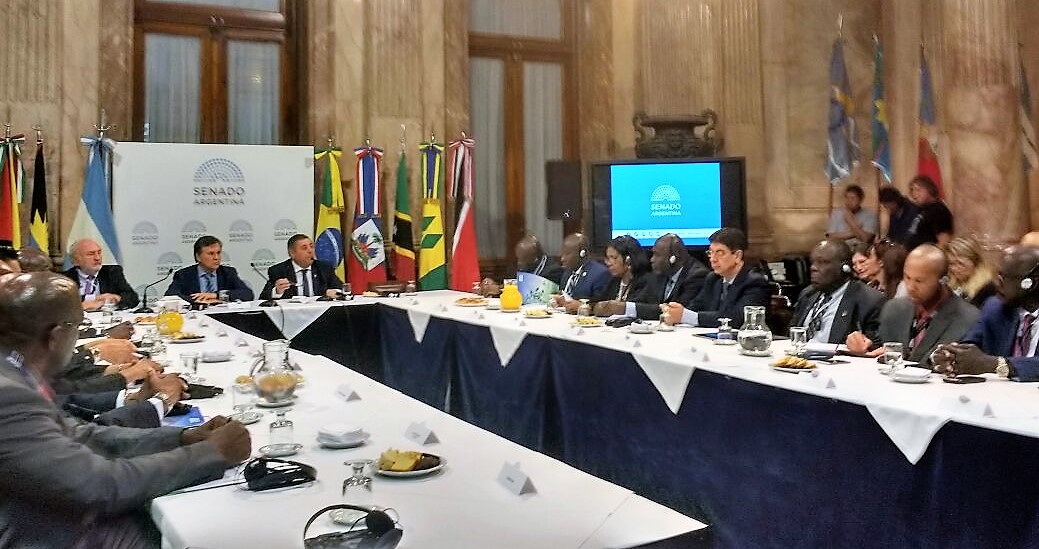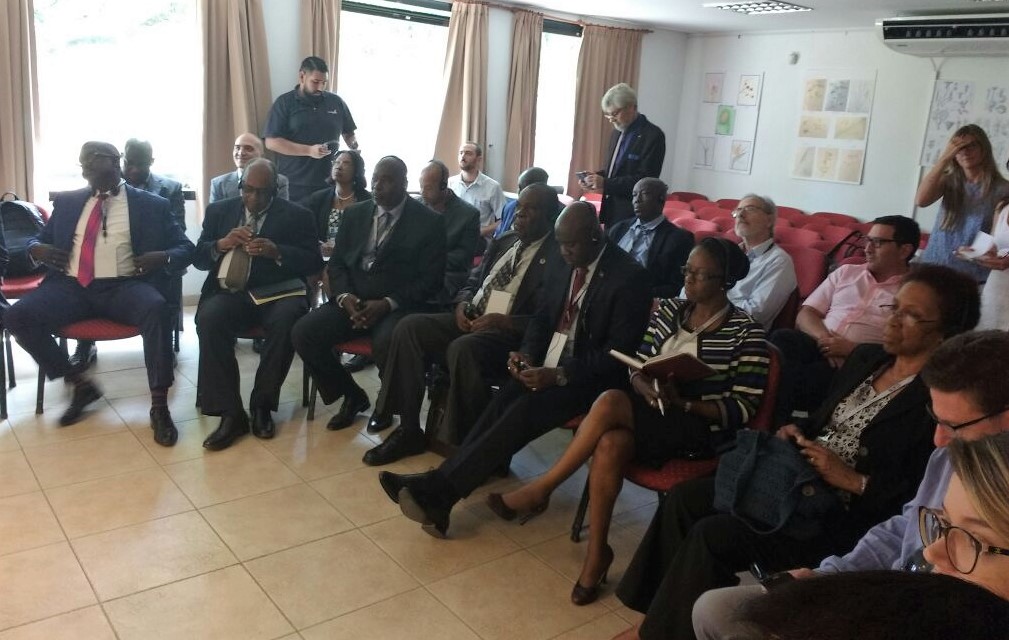Caribbean Ministers and Deputy Ministers of Agriculture see potential for increased cooperation and technology transfer with Argentina and Brazil

Argentina, 15 March 2018 (IICA). Eleven Caribbean Ministers and Deputy Ministers of Agriculture today participated in a working session in Buenos Aires to share experiences with members of the Agricultural Commission of the Argentine Senate. They expressed an interest in strengthening ties with this South American country in order to acquire knowledge and innovation, primarily in the use of applied technology in agricultural production.
Officials from St. Vincent and the Grenadines, Guyana, Haiti, Surinam, Antigua and Barbuda, St. Christopher and Nevis, Trinidad and Tobago, Jamaica, Haiti and St. Lucia, as well as high level representatives from CARICOM, the Organization of Eastern Caribbean States (OECS) and the Caribbean Research and Development Institute (CARDI) met in Argentina, as part of a mission led by Manuel Otero, Director General of the Inter-American Institute for Cooperation on Agriculture (IICA), which also included the participation of Caio Rocha, Brazil’s National Secretary of Food and Nutritional Security.
IICA indicated that the schedule also included a meeting in the Senate with President of the Agricultural Commission, Alfredo De Ángeli and a visit to the National Centre for Agricultural Research at the National Agricultural Technology Institute (INTA) to tour research facilities that specialize in Natural Resources, Climate and Water and Domestic Agriculture. They were accompanied by INTA’s President, Juan Balbín, who made repeated reference to the institution’s activities and its interaction with the private and academic sectors. Also on the agenda were meetings with the Minister of Agroindustry, Luis Miguel Etchevehere and the Minister of Foreign Affairs, Daniel Riamondi.
The objective of IICA’s mission, which included a working session in Brasilia, Brazil, prior to the Caribbean officials’ arrival in Argentina, is to facilitate access to cooperation and technology by nations vulnerable to climate change and to address the issue of food security.
“We see this initiative as an important first step in strengthening cooperation between the countries of the Organization of Caribbean States (OECS), the governments of Argentina and Brazil and IICA. The initiative provides a platform through which we may enhance south-south cooperation and knowledge and skills sharing”, said Beverly Best, OECS’ head of Cooperation for Development and Resource Mobilization.
She stated further that “Brazil and Argentina have made significant strides in agricultural development and the inclusion of family farmers in this development. Most farmers in OECS countries are small farmers, and thus we consider this to be an excellent opportunity to collaborate and to learn about best practices that exist here and share advances made in agriculture.”
The OECS is comprised of Antigua and Barbuda, Dominica, Grenada, Montserrat, St. Vincent and the Grenadines, St. Lucia, St. Kitts and Nevis, Anguilla, Martinique and the British Virgin Islands, with a total population of 1.8 million inhabitants.

On the other hand, Desiree Field-Ridley, CARICOM’s Officer in charge of Trade and Economic Integration, explained that “agriculture is one of our key sectors, but it has not grown as needed or expected, and therefore we are seeking some kind of assistance that will allow us to offer the necessary support to this activity. IICA’s work is very important in this regard and we realize that we can cooperate with Brazil and Argentina. Agriculture should be the industry that attracts youth and investors and it should unite technology and investment.”
The officer added that “CARICOM is a single market of fifteen countries, small countries, and therefore our objective is to work together as if we were one country. This will allow us to come together and to learn from Brazil and Argentina, and in so doing to advance.”
CARICOM’s Member States are Antigua and Barbuda, Bahamas, Barbados, Belize, Dominica, Grenada, Guyana, Haiti, Jamaica, Montserrat, St. Lucia, St. Christopher and Nevis, St. Vincent and the Grenadines, Surinam, and Trinidad and Tobago, with Anguilla, Bermuda, the Cayman Islands, Turks and Caicos and the British Virgin Islands as Associate Members.
For the most part, the Ministers and Caribbean representatives were very impressed with the technologies for protected agriculture that were described during the visit, primarily for the production of vegetables, as well as waste reduction, which is especially critical in small countries, and they considered organic agriculture to be an opportunity.
Barton Clarke, Director General of CARDI, underscored the importance that public policy in Argentina and Brazil has played in developing an agricultural industry that is closely linked to world trade.
“This is an important lesson for us. We must invest in research and innovation. The countries of the Caribbean are small and we face problems such as unemployment, poverty and high energy costs. Agriculture plays a critical role in helping to overcome social and economic ills. We have to engender capacity building for research in the Caribbean and strategic research that can foster innovation and intellectual property. I thank IICA for facilitating this visit and cooperation among countries; through this we can strengthen ties and foster alliances”, concluded Clarke.
For his part, Alexis Jeffers, Minister of Agriculture of St. Kitts and Nevis, spoke of “the tremendous support that IICA has given to the Caribbean”, and stressed the need for greater cooperation to “eliminate poverty, educate the young, and mitigate the effects of climate change to enable our region to realize its full potential”.
Before returning home, the delegates will visit San Nicolás for Expoagro, which is the most important outdoor agricultural fair in Argentina, where they will take part in a tour that has been specially arranged by the Expoagro organizers.
Related articles:
- Ministers of Agriculture of the Caribbean visit Argentina to foster greater cooperation and access to technology
- Caribbean ministers of agriculture’s visit to Brazil will focus on access to technology, cooperation and trade diversification
For more information contact:
José Alfredo Alpízar, Press and Outreach Coordinator, IICA